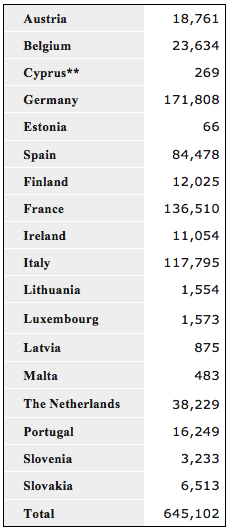The ECB Grants Debt Relief To All Eurozone Nations Except Greece
Paul De Grawe proporciona una información muy relevante sobre el momento europeo:
As part of its new policy of ‘quantitative easing’ (QE), the ECB has
been buying government bonds of the Eurozone countries since March 2015.
Since the start of this new policy, the ECB has bought about €645
billion in government bonds. And it has announced that it will continue
to do so, at an accelerated monthly rate, until at least March 2017
(Draghi and Constâncio 2015). By then, it will have bought an estimated
€1,500 billion of government bonds. The ECB’s intention is to pump money
in the economy. In so doing, it hopes to lift the Eurozone economy out
of stagnation.
I have no problems with this. On the contrary, I have been an
advocate of such a policy (De Grauwe and Ji 2015). What I do have
problems with is the fact that Greece is excluded from this QE
programme. The ECB does not buy Greek government bonds. As a result, the
ECB excludes Greece from the debt relief that it grants to the other
countries of the Eurozone.
How is this possible? When the ECB buys government bonds from a
Eurozone country, it is as if these bonds cease to exist. Although the
bonds remain on the balance sheet of the ECB (in fact, most of these are
recorded on the balance sheets of the national central banks), they
have no economic significance anymore. Each national treasury will pay
interest on these bonds, but the central banks will refund these
interest payments at the end of the year to the same national
treasuries. This means that as long as the government bonds remain on
the balance sheets of the national central banks, the national
governments do not pay interest anymore on the part of its debt held on
the books of the central bank. All these governments enjoy debt relief.
How large is the debt relief enjoyed by the governments of the
Eurozone? Table 1 gives the answer. It shows the cumulative purchases of
government bonds by the ECB since March 2015 until the end of April
2016. As long as these bonds are held on the balance sheets of the ECB
or the national central banks, governments do not have to pay interest
on these bonds. The ECB has announced that when these bonds come to
maturity, it will buy an equivalent amount of bonds in the secondary
market. We observe that the total debt relief granted by the ECB until
now (April 2016) to the Eurozone countries amounts to €645 billion. We
also note the absence of Greece and the fact that the greatest adversary
of debt relief for Greece, Germany, enjoys the largest debt relief from
the ECB.
The announcement of the ECB that it will continue its QE programme
until at least March 2017 and that it will accelerate its monthly
purchases (from €60 billion to €80 billion a month) implies that the
debt relief that will have been granted in March 2017 will have more
than doubled compared to the figures in Table 1. For many countries,
this will amount to debt relief of more than 10% of GDP.
Table 1 Cumulative purchases of government bonds (end of April 2016)
(million euros)
(million euros)

link al artículo completo
link al artículo de de Jorg Bibow: El caso para el abandono del euro por Alemania#Gexit
#Gexit, the departure of the strong, would be less disruptive for the
Eurozone as a whole. Germany could declare next Sunday that it
re-introduces the deutschmark converting all domestic euro contracts and
prices at a 1:1 rate. (Perhaps the Dutch and Austrians might consider
going along with it, but I leave that possibility aside here.) On Monday
morning the Bundesbank would stand by and cheer the new deutschmark
surge on the exchanges. It would follow the advice of Deutsche Bank and raise German interest rates to make sure savers get their well-deserved rewards.
The German government would proudly announce to its citizens that
they will no longer have to bail out any lazy Europeans but will from
now on enjoy the real fruits of their hard-won übercompetitiveness. And
so all Germans would live happily ever after. Tranquilized by their
stability-oriented ideology they would ignore any discomfort coming
along with the chosen deflationary adjustment; just as they have ignored
the agonies experienced elsewhere in the Eurozone since 2009. And they
would be troubled even less by any surges in indebtedness (and resulting
bankruptcies), private and public, coming along with such a
deflationary adjustment; just as they saw no reason to concern
themselves with these kind of side effects elsewhere in the Eurozone
since 2009 either.
Essentially, the current Eurozone has Germany’s euro partners serving
as the economic wasteland that is keeping the euro low so that German
exports have it easier globally. By contrast, the new Eurozone (ex
Germany) would see its external competitiveness restored instantly,
especially vis-à-vis Germany itself; while, internally, any remaining
competitiveness imbalances would be minor compared to a status quo that
includes Germany. Unshackled from German idiosyncrasies in all matters
of macroeconomics, the Eurozone would follow through with my Euro
Treasury plan and henceforth smartly invest in their joint future – a
future of prosperity rather than impoverishment. Unhindered by German
pressures and supported by constructive rather than destructive fiscal
policy the ECB would continue its current course and re-establish price
stability in a couple of years. If they preferred to return to their
national currencies, that would be the other avenue to climb out of
their euro trap. I personally think that, if the Euro Treasury were
established, the members of the Eurozone (ex Germany) would be better
off with the euro. But that is their choice to make.
Meanwhile, Europe is far too important to be left to the Germans.
Jörg Bibow
